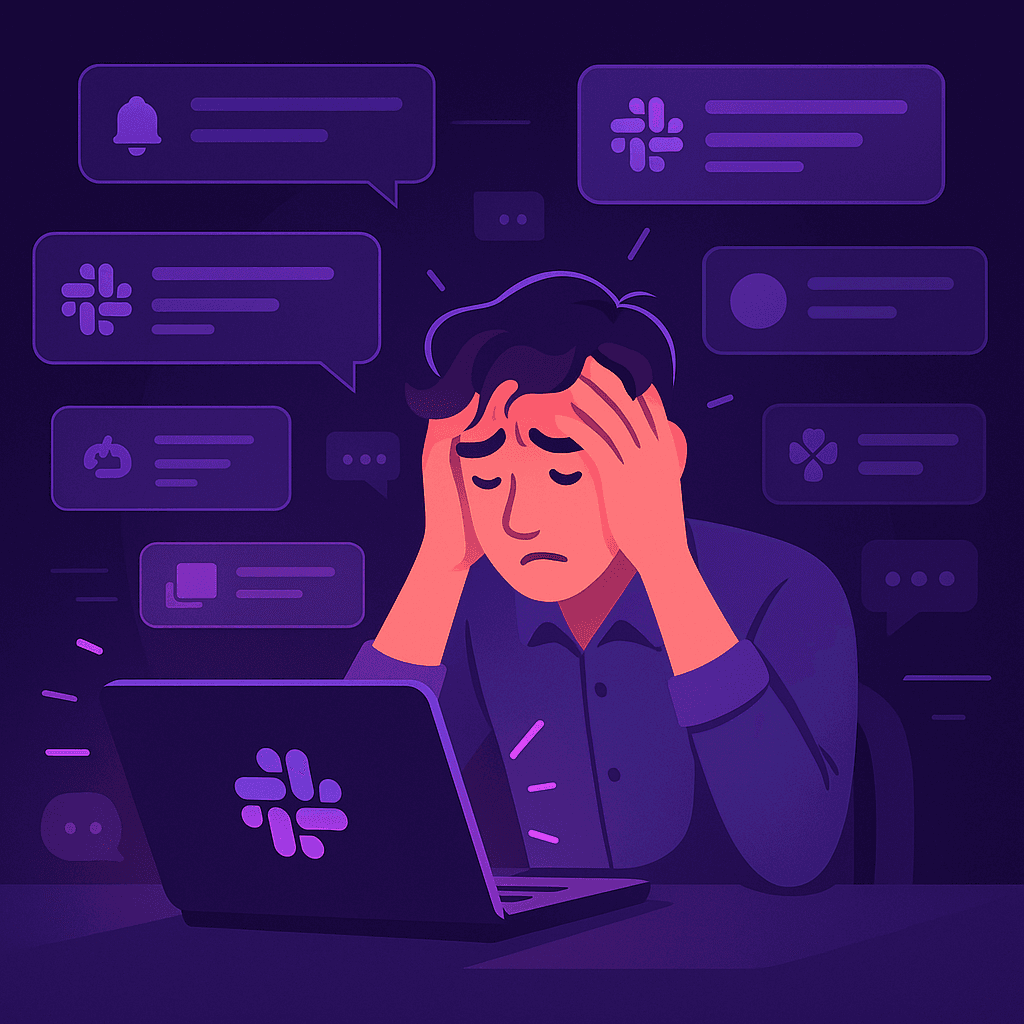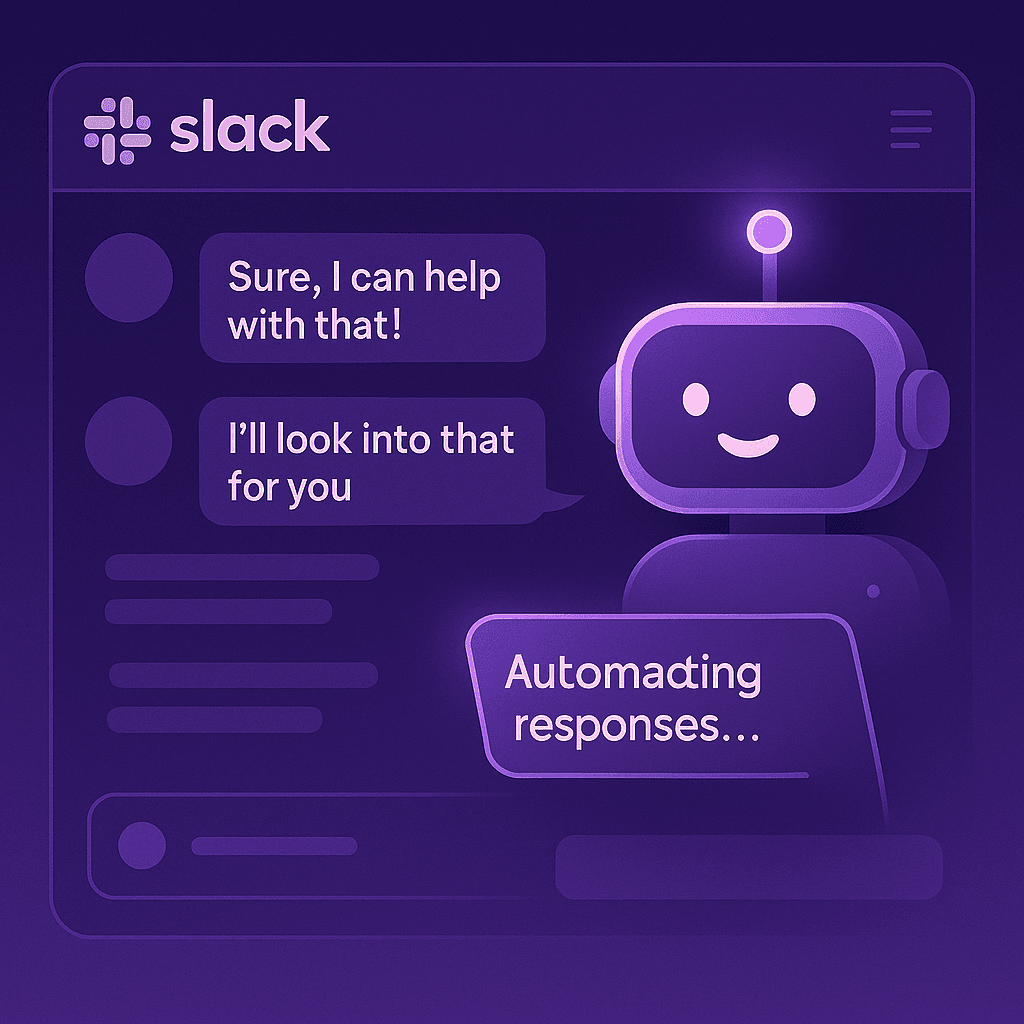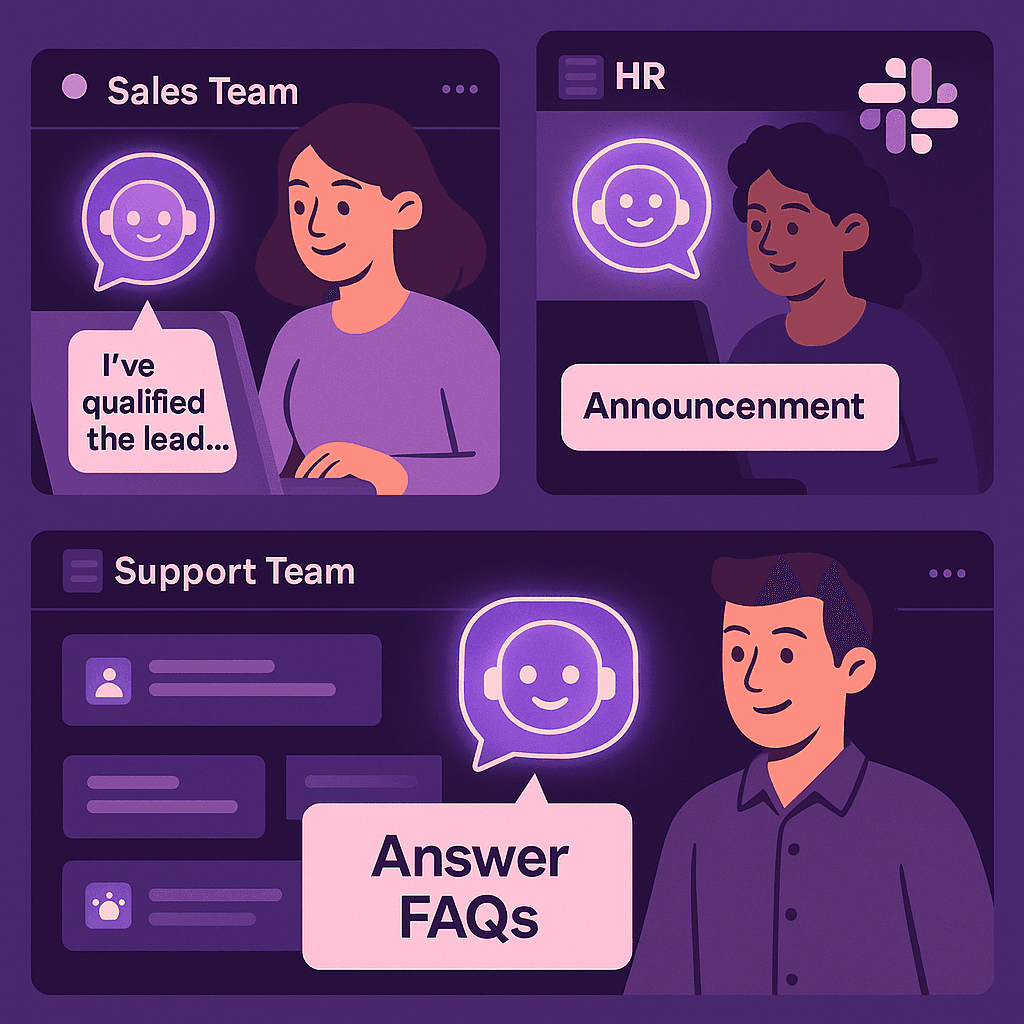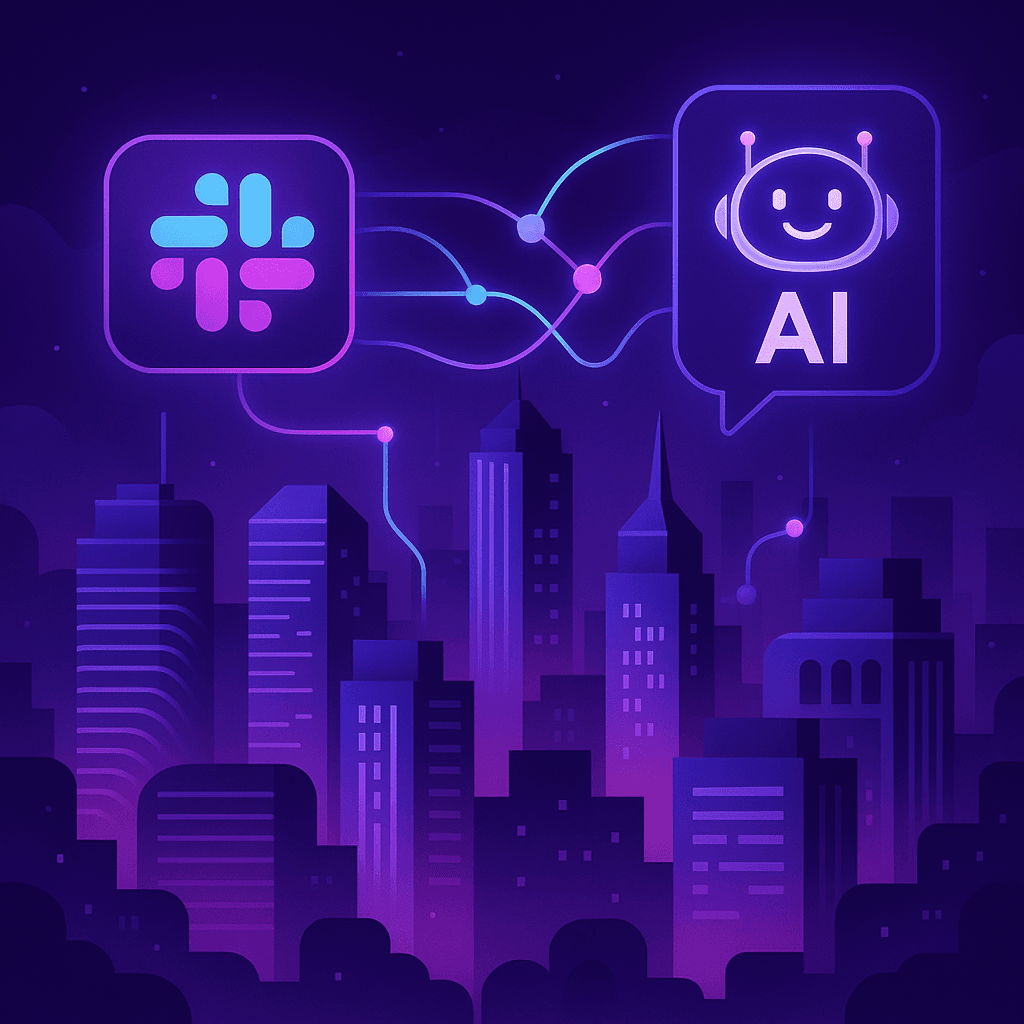
Category
use cases
Published
Aug 28, 2025
Updated
Feb 27, 2026
Author
Tags
Why Every Slack Team Needs an AI Agent in 2026
In 2025, the workplace is at a tipping point for AI-driven productivity. Teams everywhere are searching for ways to cut through digital noise and eliminate repetitive tasks. Enter slack ai agents - digital teammates that automate helpdesk queries, streamline routine updates, and supercharge workflows. According to a recent Fortune study, Slack’s AI features are already saving users a staggering 97 minutes per week. This blog unpacks why every Slack team will need an AI agent in the coming year, what these bots can do, and how to easily get started.
The Problem with Manual Slack Usage

Every team knows the pain: endless Slack pings, repeated questions (“What’s the WiFi password?”), and the constant distraction of manual workflows. While Slack is designed to connect, it can also be a source of context switching and lost productivity.
A 2024 Arxiv study highlights that knowledge workers lose significant time to inefficient messaging and manual processes. The constant barrage of notifications creates “switching costs,” where it takes extra time to regain focus after interruptions. This is even more pronounced in distributed teams, where asynchronous communication is the norm.
Manual handling of FAQs, reminders, approvals, and updates slows everyone down. Without automation, teams spend hours each week on tasks that could be handled by a sophisticated slack bot or slack chatbot. The result? Less time for high-value work, increased burnout, and slower project delivery.
What Slack AI Agents Bring to Teams

The new generation of slack ai agents is specifically designed to tackle these productivity hurdles. Here’s how they create real impact for teams in 2025:
1. Automated Responses to Repetitive Queries
Imagine never having to answer, “Where’s the vacation policy?” again. Slack AI agents, powered by advanced slack chatbot or slack plugins, instantly resolve FAQs and support requests. This not only saves time for knowledge workers but also ensures consistent, accurate information every time.
2. Slack Standups and Meeting Summaries
The classic daily standup is ripe for automation. A slack standup bot can collect updates from every team member, summarize key points, and deliver concise digests—no manual note-taking needed. Meeting summaries keep everyone aligned, even across time zones.
3. Workflow Automation: Notifications, Approvals, and Reporting
Modern Slack AI agents act as workflow orchestrators. Using a slack ai workflow builder, teams automate:
- Routine notifications (project milestones, incident alerts)
- Multi-step approvals (expense reports, access requests)
- Automated reporting (sales KPIs, sprint progress)
No more chasing people for updates or approvals—everything is handled by the bot, with full transparency.
4. Slack Automated Messages for Reminders and Nudges
Forgetful teams? Slack automated messages can remind users about deadlines, incomplete tasks, or upcoming meetings. These gentle nudges improve accountability and reduce follow-up emails.
5. Custom Processes: Make a Slack Bot That Fits Your Team
The real power lies in customization. Want to build a bot that triggers when a customer submits a ticket? Need a workflow that escalates issues to the right manager? Today’s slack automation tools make it easy to make a slack bot tailored to your exact needs.
-
Productivity ROI
The math is simple: If an AI agent saves each team member just 90 minutes a week, a 10-person team regains nearly 60 hours monthly. That’s time redirected from manual drudgery to high-value, strategic work.
Real-World Examples of Slack AI Agents in Action

AI-powered Slack bots are already transforming how teams operate. Here are three practical scenarios:
1. Reducing Onboarding Load with Automated FAQs
HR teams use Slack AI agents to answer common onboarding questions, share policy documents, and guide new hires through their first week. This frees up HR staff and ensures a consistent, welcoming experience.
2. Sales Teams Qualifying Leads Faster
Sales teams deploy slack bot assistants to triage inbound leads, qualify prospects, and even set up meetings—all without manual intervention. This enables faster response times and higher conversion rates.
3. Ops and HR Automating Repetitive Announcements
Operations and HR departments use Slack plugins to broadcast announcements, remind staff about compliance deadlines, and share key company updates. Automation ensures messages are timely and no one is left out.
For a detailed look at the ROI across other platforms, check out How AI Agents Save Time and Money for Businesses.
And if you’re looking to create a seamless experience across multiple channels, don’t miss our guide on why every business needs a 24/7 AI agent on WhatsApp in 2025.
How to Add SketricGen to Slack
Ready to level up your team’s productivity? Adding SketricGen’s Slack AI agent is simple. Our platform offers a plug-and-play experience—no coding needed. Follow our step-by-step integration guide to get started in minutes.
Once installed, you can build custom workflows, automate routine messages, and monitor performance—all within the SketricGen Dashboard. Whether you want to automate standups, handle FAQs, or create custom Slack automation, SketricGen makes it effortless.
The Future of Slack + AI Agents

Slack’s own AI feature roadmap shows that the future is all about seamless collaboration between humans and AI. The next generation of AI agents will go beyond chat—they’ll become workflow engines, surfacing insights, spotting trends, and automating strategic tasks.
As AI becomes more embedded in Slack, expect:
- Smarter context-aware bots that understand your workflow
- AI-driven insights for project management and reporting
- Enhanced trust, compliance, and privacy controls for enterprise teams
Teams that embrace slack ai agents early will gain a competitive edge—more time, less stress, and better results.
FAQs about Slack AI Agents
Q. What are Slack AI agents and how do they work?
Slack AI agents are advanced bots or plugins that automate routine tasks, answer FAQs, and orchestrate workflows inside Slack. Powered by AI and machine learning, they interact with users, trigger workflows, and integrate with other business tools.
Q. How do I make a Slack bot for my team’s custom needs?
You can make a Slack bot using no-code platforms like SketricGen, Slack’s native workflow builder, or by coding with Slack’s API. Define your triggers, actions, and responses to build a bot tailored to your processes.
Q. Can Slack AI agents automate standups and meeting summaries?
Absolutely. Slack standup bots collect updates, summarize discussions, and share key points automatically. This saves time and ensures alignment across remote teams.
Q. What is the ROI of using Slack automation in 2025?
Studies show Slack automation can save users up to 97 minutes a week. For a 10-person team, that’s nearly 60 hours per month. The ROI compounds with more complex workflows and integrations.
Q. Are Slack AI agents secure and compliant for my business?
Yes. Leading platforms like SketricGen and Slack adhere to enterprise-grade security and compliance standards. Always review your provider’s security documentation for peace of mind.
Conclusion
Slack AI agents are not a nice-to-have in 2025—they’re a must for any team that values time, productivity, and focus. By automating responses, orchestrating workflows, and reducing manual effort, these advanced bots transform Slack from a chat tool into a true productivity engine.
Try SketricGen with Slack today → boost team efficiency and free your team from repetitive tasks. Start building your first Slack AI Agent now in the SketricGen Dashboard.
Related blogs
View more
AI in Research: How Analysts Use AI Agents Efficiently
May 16, 2025
use cases
5 Reasons Your WordPress Site Needs an AI Agent in 2026
Jun 19, 2025
use cases
Agentic AI and AI-Driven MVP Development: Revolutionizing Startup Innovation and Product Strategy
Jun 25, 2025
use cases
Retail Reimagined: How Agentic AI is Transforming Consumer Interaction
Jul 1, 2025
use cases
Why Every Business Needs a 24/7 AI Agent on WhatsApp in 2026
Jul 11, 2025
use cases
Top 5 AI Agents for Your Squarespace Website in 2026
Jul 15, 2025
use cases